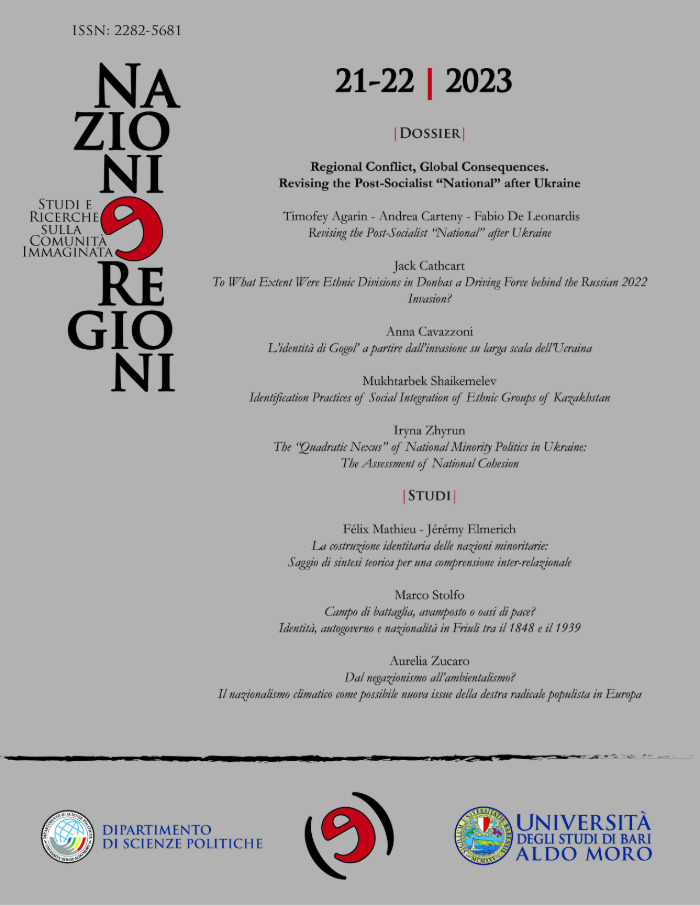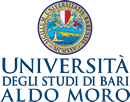L’identità di Gogol’ a partire dall’invasione su larga scala dell’Ucraina <br> <br> Gogol’s identity since the full-scale invasion of Ukraine
DOI:
https://doi.org/10.15162/2282-5681/1935Parole chiave:
Gogol’, Ucraina, nazionalismo ucraino, nazionalismo russo, decolonizzazione, Russia, canone letterario, Ukraine, Ukrainian nationalism, Russian nationalism, decolonization, literary canonAbstract
L’articolo si propone di analizzare il discorso sull’identità ucraina di Gogol’ nella pubblicistica ucraina a partire dall’inizio dell’invasione su larga scala dell’Ucraina. Gogol’, figura fortemente ibrida e simbolica della condizione di ‘piccolo-russità’, è ancora al centro di un acceso dibattito culturale. La questione di Gogol’ si intreccia alla formazione delle identità nazionali russa e polacca e al concetto di canone nazionale. L’inserimento o meno di Gogol’ all’interno del canone letterario ucraino esprime l’intenzione, da parte ucraina, di rendere definiti i confini tra le due nazionalità.
The article’s aim is to analyse the discourse on Gogol’s Ukrainian identity in the Ukrainian press since the beginning of the full-scale invasion of Ukraine. Gogol’, a remarkably hybrid figure symbolizing the condition of ‘Little-Russianness’, is still at the centre of a heated cultural debate. Gogol’s question is intertwined with the formation of Russian and Polish national identity and with the concept of national canon. Whether or not to consider Gogol’ as part of the Ukrainian literary canon expresses the intention of the Ukrainian side to clearly demarcate the borders between the two nationalities.
Riferimenti bibliografici
Anderson B. (2006), Comunità immaginate, Manifestolibri, Roma [1983].
Kappeler A. (2003), «Mazepintsy, Malorossy, Khokhly: Ukrainians in the Ethnic Hierarchy of the Russian Empire», in Kappeler A. - Kohut Z. E. - Sysyn F. E. - von Hagen M. (eds.), Culture, Nation, and Identity: The Ukrainian–Russian Encounter, 1600–1945, Canadian Institute of Ukrainian Studies Press, Edmonton-Toronto.
Barabaš Ju. (2004), Gogol’ u literaturnij svidomosti ukrajins’kogo zarubižžja, Tavrijs’kyj nacional’nyj universytet im. V. I. Vernads’kogo.
Kryms’kyj centr gumanitarnyh doslidžen’, Simferopol’.
Barabaš Ju. A. (2011), «„Svoego jazyka ne znaet...”, ili Počemu Gogol’ pisal po-russki». Voprosy literatury, (1), 36, pp. 90-93.
Berger S. - Miller A. (eds.) (2015), Nationalizing Empires, Central European University Press, Budapest.
Bhabha H. K. (2001), I luoghi della cultura, trad. it. di A. Perri, Meltemi, Roma [1986].
Bilenky S. (2020), Romantic Nationalism in Eastern Europe: Russian, Polish, and Ukrainian Political Imaginations, Stanford University Press, Stanford CA.
Bojanowska E. M. (2007), Nikolai Gogol: Between Ukrainian and Russian Nationalism, Harvard University Press, Cambridge MA-London.
Brogi Bercoff G. (2005), «La lingua letteraria in Ucraina: ieri e oggi», Studi Slavistici, II, pp. 119-136.
Brogi Bercoff G. - Pachlovska, O. - Ševčenko T. G. (2015), Taras Ševčenko: dalle carceri zariste al Pantheon ucraino, Le Monnier Università, Firenze.
Kolesnyk I. I. (2009), «Hohol in the Cultural-intellectual History of Ukraine: Myths and Stereotypes (to the 200th anniversary of his birth)», Ukrainian Historical Journal, 2, pp. 135-160.
Kordun O. (2023), «A Difficult Farewell to the Empire: Practices of Overcoming the Totalitarian Past in Ukraine», Problems of World History, 20, pp. 48-62.
Ilchuk Y. (2020), «The Translator In-Between: Ukrainian Translations of Nikolai Gogol’s Taras Bul’ba (1835, 1842)», in Achilli A. - Yekelchyk S. - Yesypenko D. (eds.), Cossacks in Jamaica, Ukraine at the Antipodes: Essays in Honor of Marko Pavlyshyn, Academic Studies Press, Boston.
Ilchuk Y. (2021), Nikolai Gogol: Performing Hybrid Identity, University of Toronto Press, Toronto.
Ilnytzkyj O. (2002), «Cultural Indeterminacy in the Russian Empire: Nikolai Gogol’as a Ukrainian Post-Colonial Writer», in Morris P. D. (ed.), A World of Slavic Literatures: Essays in Comparative Slavic Studies in Honor of Edward Mozejko, Slavica, Bloomington IN.
Kortunov A. (2022), «Tri desjatiletija boleznennych korrektirovok. Rossija na postsovetskom prostranstve», Rossijskij Sovet po Meždunarodnym Delam, 1-IV,
https://russiancouncil.ru/analytics-and-comments/analytics/tri-desyatiletiya-boleznennykh-korrektirovok-rossiya-na-postsovetskom-prostranstve/ (ultimo accesso 20-XI-2023).
Leerssen J. (2021), «Note per una definizione del nazionalismo romantico», Nazioni e Regioni. Studi e ricerche sulla comunità immaginata, n. 17, pp. 63-90 [2013].
Liubarets A. (2016), «The Politics of Memory in Ukraine in 2014: Removal of the Soviet Cultural Legacy and Euromaidan Commemorations», Kyiv-Mohyla Humanities Journal, 3, pp. 197-214.
Luckyj G. (1971), Between Gogol’ and Ševčenko: Polarity in the Literary Ukraine: 1798-1847, W. Fink, München.
Gironi C. (2023), «Decolonizing Kyiv’s Politics of Memory: Current and Potential Implications of Russia’s 2022 Invasion of Ukraine on Ukrainian Monuments and Toponyms», The Journal of International Relations, Peace Studies, and Development, 8, 1, pp. 1-19.
Gogol’ V. N. (2012), Taras Bul’ba e gli altri racconti di Mirgorod, Garzanti, Milano.
Grabowicz G. G. (1992), «Ukrainian-Russian Literary Relations in the Nineteenth Century: A Formulation of the Problem», in Potichnyj P. J. et al. (eds.), Ukraine and Russia in Their Historical Encounter, Canadian Institute of Ukrainian Studies Press, Edmonton.
Grabowicz G G. (1994), «Hohol’ i mif Ukrajiny», Sučasnist’, 9, pp. 77-92.
Grabowicz G. G. (2003), «Between Subversion and Self-Assertion: The Role of Kotliarevshchyna in Russian-Ukrainian Literary Relations», in Kappeler A. - Kohut Z. E. - Sysyn F. E. - von Hagen M. (eds.), Culture, Nation, and Identity: The Ukrainian–Russian Encounter, 1600–1945, Canadian Institute of Ukrainian Studies Press, Edmonton-Toronto.
Malanjuk Je. (1962), Knyha sposterežen’. Proza, Homìn Ukraïni, Toronto.
Naydan M. M. (2010), «When You Google Gogol, you Never Get ‘Hohol’: The Re-colonization of a Ukrainian Writer », Ukrainian Quarterly, 66, 1-2, pp. 5-15.
Puleri M. (2016), Narrazioni ibride post-sovietiche: Per una letteratura ucraina di lingua russa, Firenze University Press, Firenze.
Puleri M. - Achilli A. (2023), «Beyond War: Russia, Ukraine and the State of the Field», ESamizdat. Rivista di culture dei paesi slavi / Journal of Slavic Cultures / Журнал славянских культур, 15, pp. 19-24,
www.esamizdat.it/ojs/index.php/eS/article/view/153 (ultimo accesso 1-VII-2023).
Rewakowicz M. G. (2018) Ukraine’s Quest for Identity: Embracing Cultural Hybridity in Literary Imagination, 1991–2011, Lexington Books, Lanham MD.
Riabczuk M. (2015), UKRAINA. Syndrom postkolonialny, KEW, Wrocław-Wojnowice.
Saunders D. (1985), The Ukrainian Impact on Russian Culture (1750-1850), Canadian Institute of Ukrainian Studies, Edmonton.
Shkandrij M. (2020), «Channel Switching: Language Change and the Conversion Trope in Modern Ukrainian Literature», Journal of Soviet and Post-Soviet Politics and Society, 6, 1, pp. 39-58.
Sobol V. (2020), Haunted Empire: Gothic and the Russian Imperial Uncanny, Cornell University Press, Ithaca NY.
Tlostanova M. V. - Mignolo W. (2012), Learning to Unlearn: Decolonial reflections from Eurasia and the Americas, The Ohio State University Press, Columbus OH.
Von Hagen M. (1995), «Does Ukraine Have a History?», Slavic Review, 54, 3, pp. 658-673.
Downloads
Pubblicato
Fascicolo
Sezione
Licenza
Nazioni e regioni è una rivista open access che applica la licenza Creative Commons CC BY-NC-ND 4.0 a tutti i contenuti pubblicati.
Nazioni e regioni is an open-access journal that applies the Creative Commons CC BY-NC-ND 4.0 licence to all published contents.







